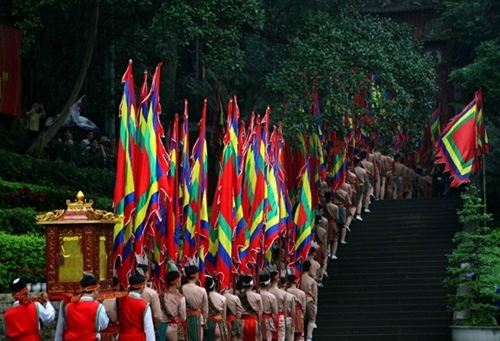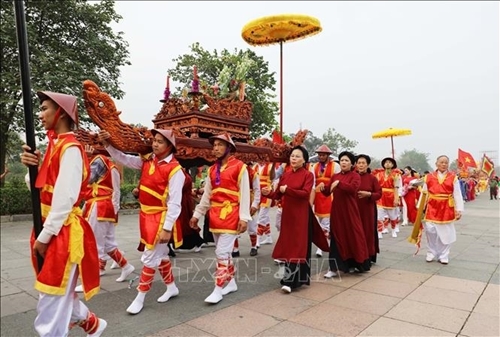The Hung Kings worship creates the spirit of unity and patriotism for all Vietnamese people, regardless of differences in ideology, beliefs, or regions. Through the ages, the kings serving as the shared legendary ancestors have helped heighten individual awareness of our shared national heritage. A visit to the historical site of Hung Kings Temple evokes a sense of pride of the nation's roots. Not by chance, exactly 70 years ago, President Ho Chi Minh inspired all the Vietnamese people with the saying, “The Hung Kings founded our nation. We must defend the nation together.”
    |
 |
|
The Hung Kings' Death Anniversary - Hung Kings Festival affirms the beautiful cultural values of the Vietnamese people. |
Thanks to the values of unity and patriotism that the worship ritual of the Hung Kings brings to our nation, we have overcome all difficulties, defeated all enemies. Through thousands of years of fighting against foreign invaders, by maintaining cultural values, with a profound consciousness of the common ancestors, we have achieved the final victory and become independent. Today, in the context of deep international integration, thanks to the traditional cultural values of the nation, we confidently integrate without being assimilated, affirming the country's position with the strength of independent and self-reliant culture.
The Hung Kings' Death Anniversary - Hung Kings Festival has established a spiritual basis and assurance for Vietnam's culture to integrate into the world more effectively. As Party General Secretary Nguyen Phu Trong stated at the National Culture Conference in 2021, “Culture is the soul of the nation. It reflects the national identity. As long as culture exists, the nation exists.” The symbol of the Hung Kings is an important part of determining the national cultural sovereignty. When turning to the Hung Kings, we will share sacred feelings about the nation, creating an immensely powerful collective strength.
Thus, the Hung Kings' Death Anniversary - Hung Kings Festival is not only an occasion to pay tribute to our ancestors, but also an opportunity to boost national pride, raise awareness of cultural values, and promote solidarity of the entire country in the era of global integration.
To continue to promote the cultural values and spiritual strength of the Hung Kings' Death Anniversary - Hung Kings Festival, we need to focus on and pay attention to the implementation of Vietnam's commitments to UNESCO in the dossier of the Hung Kings worship ritual in Phu Tho province. We need to promote the values of the historical and cultural relics related to the Hung Kings' Death Anniversary - Hung Kings Festival, ensuring that these heritages are preserved and passed on to the future generations sustainably. We also need to maintain traditional values such as solidarity, national pride, and gratitude to the ancestors.
    |
 |
|
The ceremonial procession to the Hung Kings Temple during the Hung Kings' Death Anniversary (Photo: VNA) |
Additionally, it is necessary to encourage active participation of the entire community in organizing and participating in the Hung Kings' Death Anniversary - Hung Kings Festival, focusing on developing cultural tourism related to the Hung Kings' Festival, creating favorable conditions for domestic and foreign tourists to explore and experience Vietnam's traditional culture through sightseeing, learning, and experiencing activities; expanding cultural exchange with the international friends, promoting understanding and cooperation between Vietnam and other countries. We need to support and develop localities, especially the ones directly related to the Hung Kings' Festival, so that they can actively organize and participate in cultural and tourism activities.
By paying attention to these issues, we can continue to preserve and promote the spiritual strength and cultural values of the Hung Kings' Death Anniversary - Hung Kings Festival, contributing to the comprehensive development of our country.
By Assoc. Prof., Dr. Bui Hoai Son, Permanent Member of the Committee for Culture and Education of the National Assembly
Translated by Trung Thanh